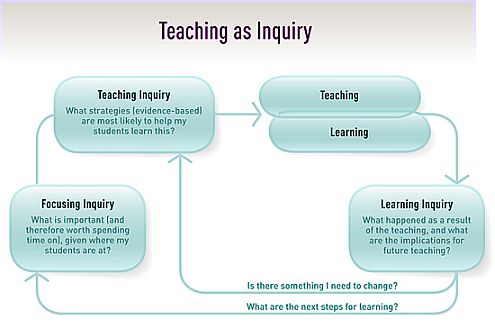Teaching as inquiry
Effective teaching requires the teacher to reflect critically on the effectiveness of their actions.

Teaching as inquiry diagram from NZC.
If you cannot view or read this diagram, select this link to open a text version.
The three inquiries
Critical reflection can begin at any point in the teaching as inquiry cycle but will always include:
-
A focusing inquiry
This involves knowing your students. Use data from a range of sources to identify what they know and to determine priorities for teaching and learning.
-
A teaching inquiry
This involves using outcomes from the focusing inquiry to determine which strategies are most likely to help your students develop the prioritised understandings.
-
A learning inquiry
This involves assessing the effectiveness of the teaching in terms of student outcomes: Have they learned what you set out to teach? This inquiry is ongoing.
Learning inquiry seeks to answer these questions:
- What happened as a result of my teaching?
- What are the implications for future teaching?
- Is there something I need to change?
- What do I need to learn in order to help my students learn?
- What evidence-based strategies can I use to help my students learn?
What this might look like
Before beginning to teach a class, use the available evidence to identify student capabilities, needs, and interests. This may include attendance data; asTTle reading, writing, and mathematics data; PAT scores; reports; ethnicity data. From this information, a class profile will be established and recorded that will also identify the potential groupings within the class, as well as highlighting the teaching and learning approaches that will support the groups and the class as a whole.
Use a diagnostic assessment prior to starting a new unit of work and use the information gained as a basis for programme planning.
During the teaching of a unit, regularly use formative assessment strategies to gauge and monitor student progress; to enhance learning, adjust the programme in light of the information gathered. Formative assessment strategies could include: questioning for understanding, self- and peer-assessment, feedback and feed-forward, student reflection (for example, Points I am sure of … Points I need more work on …).
< back to pedagogy
Last updated December 5, 2011
TOP


